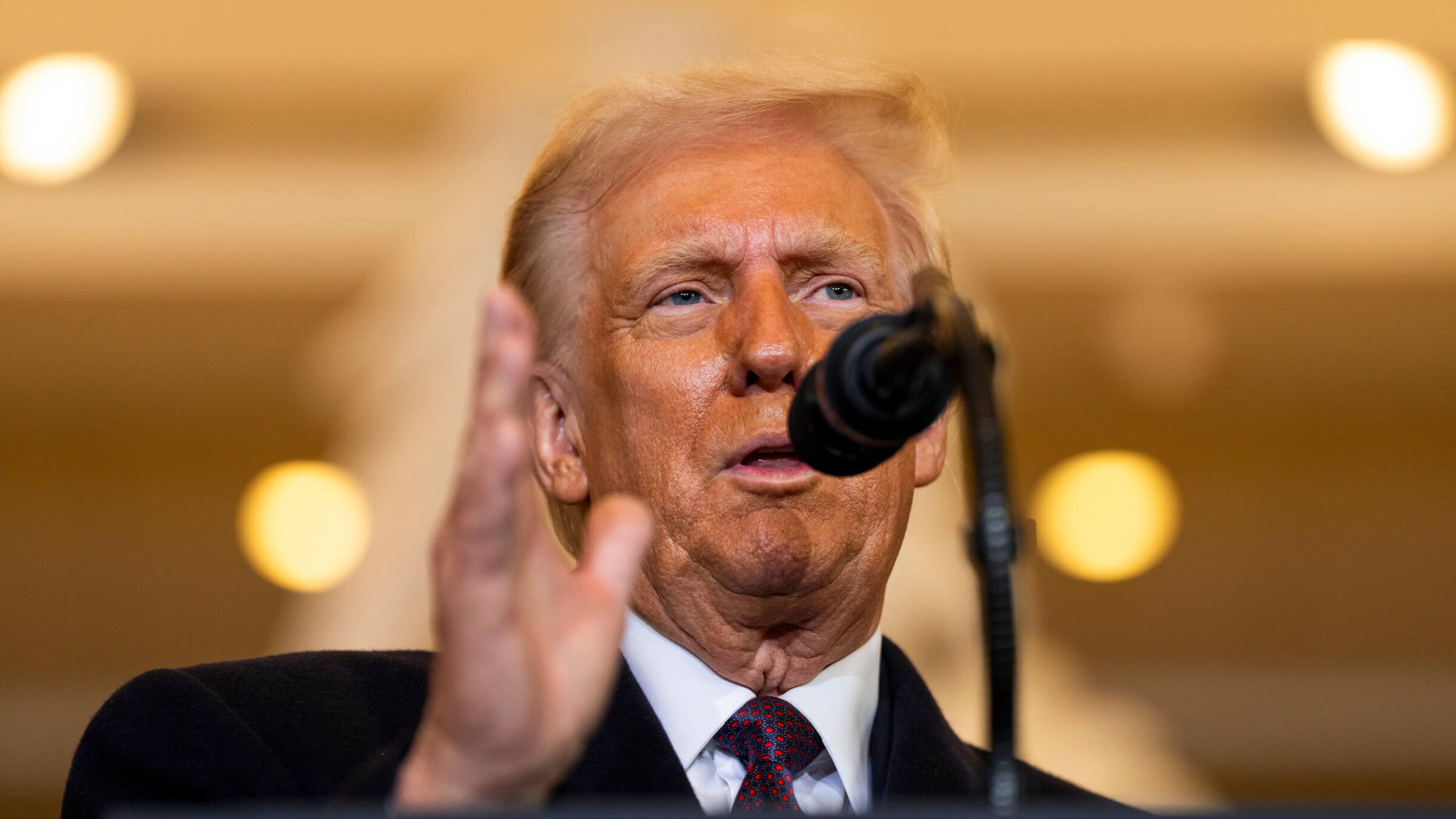As a new Trump administration begins, I’m looking to this Soviet Jewish dissident for guidance
If you’re alarmed as I am by the new president’s first actions in office, the rights-based dissident movement has lessons to share

U.S. President Donald Trump addresses guests and supporters after his inauguration on Jan. 20, 2025. Photo by Greg Nash-Pool/Getty Images
As I listened to President Donald Trump’s inauguration speech Monday, I thought about Alexander Esenin-Volpin.
It had been a morning of Trump updates that weren’t just upsetting, but also befuddling. It began with news that the president plans to try to end birthright citizenship via executive order, despite birthright citizenship being enshrined in the 14th Amendment — meaning that a president does not have the power to single-handedly retract it. In his inaugural address, Trump talked about ending efforts to “socially engineer race and gender into every aspect of public and private life,” a clear prelude to executive orders, also announced Monday, that will aim to end protections for trans and gender-nonconforming people and quash diversity, equity and inclusion programs — as though it is these protections that discriminate against Americans, when in fact it is their elimination that will do so.
As we enter another four years of government under Trump, moments like these — in which what the president says seems to blatantly contradict the law of the land or even reality — examples like that of Esenin-Volpin, a dissident mathematician and poet in the Soviet Union, will be a crucial reminder of how we ought to react.
Esenin-Volpin, born more than a century ago in 1924, was the illegitimate son of Sergei Esenin, a famous poet, and Nadezhda Volpina, a Jewish translator. He became a pioneer in what’s known as the rights-based dissident movement, which was engaged in what the historian Benjamin Nathans, in his book To the Success of Our Hopeless Cause: The Many Lives of the Soviet Dissident Movement, called “civil obedience.”
Their core idea was not that theirs was a lawless society, devoid of rights. They did have rights. The problem was that those with power didn’t recognize those rights — or the laws, or the constitution — and the people let them get away with it.
So the rights-based dissidents — many of whom had at least one Jewish parent, and consequently were discriminated against for being Jewish, even if they resented being seen or thought of as such — decided to stop letting them.
Esenin-Volpin was “the first person in our life who spoke seriously about Soviet laws,” the writer and activist Vladimir Bukovsky once recalled. “We laughed at him: ‘What kind of laws can there be in this country? Who cares?’” To which Esenin-Volpin replied, per Bukovsky’s remembrance: “Nobody cares. We ourselves are to blame for not demanding fulfillment of the laws.”
Esenin-Volpin learned what the Soviet Code of Criminal Procedure said, and the rights that it afforded him: For instance, that it banned leading questions in interrogations, and gave those under interrogation the right to write their responses down themselves, rather than have them taken down — perhaps inaccurately — by a state representative. He taught others. And went on from there.
Ahead of the 1966 trial of the writers Andrei Sinyavsky and Yuri Daniel, the rights-based dissidents protested for an open trial, demanding that the Soviet constitution, which guaranteed one, be respected. (They held a protest on Dec. 5, 1965: Soviet Constitution Day.) Esenin-Volpin was similarly among those who demanded transparency in the 1968 Galanskov-Ginzburg trial, in which four people — Yuri Galanskov, Alexander Ginzburg, Alexey Dobrovolsky and Vera Lahkova — were convicted of disseminating anti-Soviet slander.
Long before Mikhail Gorbachev was touting the principle of “glasnost,” or openness, in the lead-up to the dissolution of the Soviet Union, the rights-based dissidents were demanding openness and transparency from their government, making the case that it was the government’s responsibility to demonstrate commitment to its own laws. They argued that they were entitled to such adherence by right, under the law of the land — and that that law mattered, even if their government acted every day as though it did not.
“We are all citizens of the USSR by virtue of having been born on its territory,” Esenin-Volpin wrote in an essay called “What Is Soviet?” but “the citizens of the USSR are obliged to observe the written laws, not ideological directives.”
The lesson I take from Esenin-Volpin is not that, if we just follow this one neat trick, everything will work out — that Trump’s most frightening policies won’t become law, that people won’t suffer under them, or that our new president’s very rhetoric won’t make us question the facts of the world we live in.
That is certainly not how it worked out for Esenin-Volpin’s movement. Soviet dissidents underwent arrest, imprisonment, psychiatric torture and exile. Whatever gains they did win, it is not as though, looking at Russia today, their legacy is one of overwhelming success. Per a 2022 State Department report, in 2020, Russian courts acquitted just 0.34% of all defendants — a suggestion that the courts Esenin-Volpin fought to hold to account still fundamentally operate as tools of the state.
More recently, Amnesty International warned that Russia was using anti-terrorism laws to curb dissent, a reminder both of the limits of civil obedience and of the limitless potential for unjust interpretation of laws under authoritarian governments.
Instead, the lesson I take is that there is an inherent value to insisting on our right to a government that follows its own rules — and that the earlier and more intensely we begin that insistence, the less likely we will be to succumb to the same inertia Bukovsky chronicled Esenin-Volpin speaking out against.
As Vladimir Dremlyuga, who protested the Soviet invasion of Czechoslovakia in Moscow’s Red Square in 1968, said of his decision to do so: “All my conscious life I have wanted to be a citizen — that is, a person who proudly and calmly speaks his mind. For 10 minutes, I was a citizen.”
It is tempting, in the face of reports that Trump aspires to end birthright citizenship with the flick of a pen, to throw up one’s hands and pronounce that nothing matters. But some things do still matter, don’t they? We do still have a constitution, and we do still have inalienable rights. Maybe our government wants to wish those away, but we shouldn’t let it.
After all, if Alexander Esenin-Volpin could remember that they mattered in the 1950s in the Soviet Union, then maybe we can remember it today — and tomorrow, and for the next four years — too. Perhaps, for more than 10 minutes, we, too, can be citizens.
















